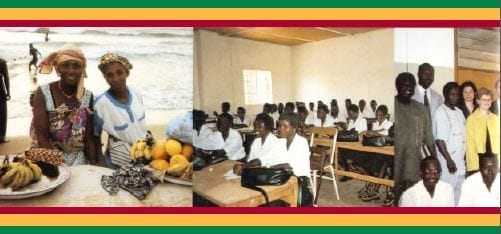By Gopi Kallayil, WG’98
In the searing May heat I looked around the room for a fan and there was none. I looked at the walls and I could spot no switches or wiring. I realized that the school we were in had no electricity. But the rural high school students we were talking to ran a sophisticated company complete with marketing departments, finance directors and annual reports to the shareholders. The country had no stock exchange but the 14-year-olds displayed a financial acumen and understanding of business basics that astounded us. We were in The Gambia, West Africa, as part of the Wharton International Volunteer Project.
The Wharton International Volunteer Project (WIVP) is a student-led initiative that sends teams of Wharton students to work in partnership with non-governmental and charitable organizations on local projects in emerging economies as well as in underprivileged U.S. communities. The projects provide management services to these agencies on a pro-bono basis.
This past summer, 31 students worked on projects in 10 countries including India, Belize, El Salvador, Dominica, Mozambique, Ecuador, Russia, South Africa, The Gambia and the Philippines. The team in India worked with Project Mainstream to help street children micro finance their own businesses. The team in El Salvador helped small local businesses with their marketing plans. In Belize project members joined with an ecotourism group to develop a plan to promote ecotourism while protecting the area’s natural resources. And in Mozambique, the volunteers worked with Action for Enterprise to identify economic sub-sectors with strong potential for small enterprise.
There were five of us from Wharton who went to The Gambia. The word “international” in WIVP had really been stretched on our team. David Hinton is American, Finn Mcclain is Dutch-American, Esther Perkins is English, Jane Frances is Scottish and I am an Asian-Indian. Though The Gambia is an English speaking country, it has a medley of several tribal languages. To that mix we were adding multiple accents, much to the amusement of the groups we worked with. The Gambia is the smallest country in Africa with a strange geography. Located on the West African bulge, it is only 30 miles at its widest point, but is 300 miles long. The mighty Gambia River, 12 miles wide at its mouth, runs along the length of the country, dividing it into two narrow strips of land on either side. This English-speaking area is surrounded by French-speaking Senegal on three sides, forcing Senegalese to pass through The Gambia to get from one side of their country to another. The mainstay of the economy is a single annual crop of peanuts.
The Gambia is the smallest country in Africa with a strange geography. Located on the West African bulge, it is only 30 miles at its widest point, but is 300 miles long. The mighty Gambia River, 12 miles wide at its mouth, runs along the length of the country, dividing it into two narrow strips of land on either side. This English-speaking area is surrounded by French-speaking Senegal on three sides, forcing Senegalese to pass through The Gambia to get from one side of their country to another. The mainstay of the economy is a single annual crop of peanuts.
The Atlantic coast of The Gambia is blessed with spectacularly beautiful beaches that stay sunny and warm throughout the year. European sun worshippers who flock to the beach resorts have created a thriving tourism industry. Although the country’s population is only a million people, the annual inflow of tourists numbers approximately 100,000.
The Gambia shot to the limelight in the United States in the 1970’s when Alex Haley published Roots and traced his ancestry back to Juffureh village on the River Gambia.
Our host organization in The Gambia was The President’s Award Scheme, an organization that focuses on youth development in The Gambia and also runs vocational skills training centers and a program that trains and finances young entrepreneurs.
During our three-week stay the team worked on several projects at various Gambian organizations. We taught business courses in different business development programs, provided computer training at the local chamber of commerce and drafted a long-term plan to finance and expand the computer training center at a rural school. We also developed the course material for their entrepreneurship training program, making sure that the business examples used in the program were relevant to the Gambian economy. The Gambia has a young and ambitious government determined to make the country a model economy in West Africa. President Yahya Jameh, now 31, became president when he was 28. His government has developed a long-term plan for the country titled “The Gambia Inc. – Vision 2020.” The minister for youth and sport, Lamin Bajo, met with the team from Wharton and expressed his appreciation for the work we were doing. Forty-five percent of the Gambian population is under the age of 25, he explained, and therefore his ministry, which sponsors our host organization, has a significant role to play in The Gambia’s growth through youth development. His vision is to develop the technical and business skills of the youth in The Gambia, promote an entrepreneurial culture and generate employment through the private sector. He hoped that a long-term relationship will develop between Wharton and Gambian youth development agencies.
The Gambia has a young and ambitious government determined to make the country a model economy in West Africa. President Yahya Jameh, now 31, became president when he was 28. His government has developed a long-term plan for the country titled “The Gambia Inc. – Vision 2020.” The minister for youth and sport, Lamin Bajo, met with the team from Wharton and expressed his appreciation for the work we were doing. Forty-five percent of the Gambian population is under the age of 25, he explained, and therefore his ministry, which sponsors our host organization, has a significant role to play in The Gambia’s growth through youth development. His vision is to develop the technical and business skills of the youth in The Gambia, promote an entrepreneurial culture and generate employment through the private sector. He hoped that a long-term relationship will develop between Wharton and Gambian youth development agencies.
One day, Lamin Cessay, one of the students at a school we were working in, took me to the open air lunch shed where women were selling foodstuffs. I decided to get my daily fix of authentic Gambian ‘gerte’ – peanuts. An elderly woman sold me one handful for 20 bututs, or two cents. I was stunned at this micro-transaction. But in ways incomprehensible to me, out of these two cent transactions, a profit was going to be generated, perhaps a family supported, and a living made. I had difficulty in imagining how businesses could be born in an economy with such tiny transactions.
And yet we found success stories. On the Fajara beach, at the Fajara Arts and Crafts market, we met Fatou Mata. She was a graduate of the President’s Award scheme and now ran her own business. She sold beautiful African print fabric and tie-dyed material in her shop and tailored them for the tourists on Fajara beach. “In a year,” she said, “I should have paid off the government loan and this business will be mine.” Later that night we met her again, dancing happily at a concert, looking splendorous in one of her designs. And therein lay a tale and a hope that people around the world, given the spirit of enterprise, could create opportunities and wealth for themselves under the most difficult of circumstances.
Gopi Kallayil, WG’98, grew up in India and completed his undergraduate degree in electronics engineering at the University of Madras. He worked in the information technology industry in India, Hong Kong and the U.S. before coming to Wharton. An entrepreneurial management major, he spent part of last summer working with Bain & Co. in San Francisco.























